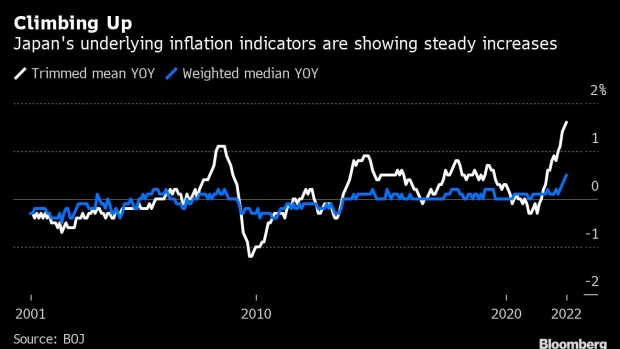Jul 26, 2022
Japan’s Deeper Inflation Trend Shows Price Growth Spreading
, Bloomberg News

(Bloomberg) -- Japan’s prices are showing more signs of rising on a wider basis as soaring commodity prices and a weak yen force companies to pass higher costs onto consumers at a pace not seen in decades.
Multiple gauges of the deeper inflation trend hit record highs in June, according to data released by the Bank of Japan on Tuesday. The trimmed mean, a measure of price growth that factors out the biggest gains and falls, rose 1.6% from a year earlier. That’s the fastest rate of increase in data back to 2001, according to the bank.
The weighted mean, a measure of prices that gives more importance to key items, also reached a fresh record. Meanwhile, the share of increasing items in the consumer price basket rose to 71.3%, the highest proportion on record.
While the indicators show Japan’s price dynamics are much cooler than the red hot growth in the US and Europe, they point to the inflation trend broadening within the economy. That would make the wave of rising prices more likely to continue and to impact policy.
Governor Haruhiko Kuroda has repeatedly emphasized the need for sustainable inflation before he considers adjusting his easing stance. The BOJ has become the notable outlier among major central banks as they rush to raise interest rates. Kuroda has insisted that higher wages are needed to turn cost-push inflation into lasting price growth.
Another BOJ report released earlier in the day, showed service prices among companies increasing 2% from a year earlier in June. Excluding the impact of a sales tax hike, that’s the biggest gain since May 1992, though the gains were led by transportation and postal services, a segment directly affected by higher fuel prices.
Other changes in price trends have also been spotted. Some BOJ board members mentioned signs of a shift in the mindset of Japanese consumers over prices, according to the minutes of policy meeting in June, also released earlier Tuesday.
©2022 Bloomberg L.P.






